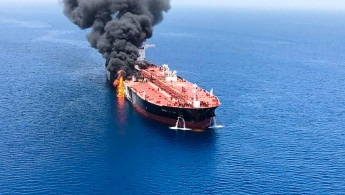Crew on Japan tanker saw 'flying object' before attack: company head
The crew of a Japanese-owned tanker hit in an apparent attack in the Gulf of Oman saw a "flying object" before a second blast on board, the operator's head said on Friday.
"The crew members are saying that they were hit by a flying object. They saw it with their own eyes," Yutaka Katada, head of Kokuka Sangyo shipping company, told reporters.
"We have received a report saying that something seems to have flew in, there was an explosion and it created a hole in the body of the ship," he added.
Katada on Thursday had told reporters that the Kokuka Courageous, which was loaded with methanol, had suffered two apparent attacks.
After the first, "our crew members made evasive manoeuvres but three hours later it was hit again," he said Thursday.
On Friday he said he did not yet have information about the nature of the first attack on the tanker.
The blasts caused a fire on board, but Katada said on Friday there had not been major damage. The crew were evacuated, with one member suffering minor injuries.
"Crew members went back to the ship with support of the US military and recovered the backup power source," Katada said.
"We'll review the overall damage but we don't think there's a possibility it will sink. There's no damage to the goods and fuel."
He added that he believed initial reports suggesting a torpedo was involved in the attack were incorrect.
"The damage was above the sea surface. It would have been below water if it was a torpedo. So I think the report is inaccurate."
The Kokuka Courageous was hit around the same time as another tanker in the area, the Norwegian-owned Front Altair, which was hit by three explosions, according to the Norwegian Maritime Authority.
There has been no claim of responsibility for the blasts, although US Secretary of State Mike Pompeo accused Iran of being behind Thursday's attacks which left at least one of the tankers ablaze off the Iranian coast.
US Central Command said it saw an Iranian patrol boat removing an "unexploded limpet mine" from the hull of the Japanese-owned tanker Kokuka Courageous and published grainy video.
Iran's state-owned English-language TV channel Press TV cast doubt on the "evidence" presented by Washington in support of its accusation against Tehran.
Press TV complained that the video missed the moment where the crew of the Iranian boat reportedly removed the alleged mine.
"Facts: (the Guards Corps) was the closest force near the incident site. #Iran was the first to rush to the scene to save the crew members," Press TV said in a tweet.
Iran’s foreign ministry slammed "baseless" US accusations it was behind twin attacks on tankers in the Gulf of Oman, adding Washington was trying to "sabotage diplomacy".
The US had "immediately jumped to make allegations against Iran - (without) a shred of factual or circumstantial evidence," Foreign Minister Mohammad Javad Zarif said in a tweet.
That showed it was "abundantly clear that the #B_Team is moving to a #PlanB: Sabotage diplomacy - including by @AbeShinzo - and cover up its #EconomicTerrorism against Iran".
Zarif regularly uses the term "B Team" to refer to US National Security Advisor John Bolton, Israeli Prime Minister Binyamin Netanyahu, and Saudi and Abu Dhabi crown princes Mohammed bin Salman and Mohammed bin Zayed, who are all pushing a hard line on Tehran.
Meanwhile, UN chief Antonio Guterres warned on Thursday that the world cannot afford a major confrontation in the Gulf.
Guterres said he strongly condemned any attack against civilian vessels.
"Facts must be established and responsibilities clarified," the UN secretary-general told a council meeting on UN cooperation with the Arab League.
"If there is something the world cannot afford, it is a major confrontation in the Gulf region."
Tensions between Iran and the US have been growing since President Donald Trump last year withdrew from an international agreement aimed at restricting Iran's nuclear programme.
Trump has since re-instated economic sanctions that have had a devastating effect on the Iranian economy.
In May, the US rushed an aircraft carrier strike group and other military assets to the Persian Gulf region in response to what it said were threats from Iran.
Follow us on Twitter: @The_NewArab





 Follow the Middle East's top stories in English at The New Arab on Google News
Follow the Middle East's top stories in English at The New Arab on Google News


